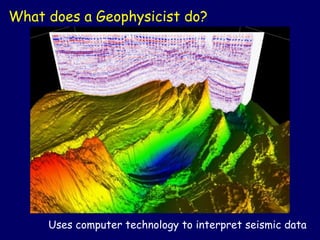All Categories
Featured
Table of Contents
Geophysical Surveys - U.s. Geological Survey in Claremont Australia 2022
Are you seeking the ideal type of b-school? Get in touch with MBA programs seeking candidates like you. Explore schools of all sizes, ranked colleges, city and big-campus schools and more. Apply. Pay. Preparation. Research study. Prosper. We have actually got you covered. Link with master's programs around the country to get an edge over the competition.

A geophysicist studies different aspects of the earth. See a video to discover what a geophysicist: Geophysicists need to make a minimum of a bachelor's degree; however, this is for an entry-level position.
If you want research you need to pursue a Ph. D. Undergrad coursework generally consists of geology, mathematics, environmental science, or physics. Advanced degrees require more particular research studies in the specialized of option. Locations can include oceanography, climatic physics, meteorology, planetary, petroleum, ecological, and mining. Task prospects are higher if you have a strong background in computer technology or technology.
Geophysical Survey In Archaeology in West Leederville Aus 2020
Access to these opportunities may be restricted depending upon where you live; however, internships or summertime programs with geophysical companies, university geophysics department, or the U.S. Geological Survey can be alternatives. You can find a list of a list of opportunities on the United States Geological Survey (USGS) sites' Pathway Programs tab (opens in another link).
Geophysicists also work with computers while investigating, so computer system courses can also be helpful, as pointed out previously in this post. Numerous geophysicists specialize in an area of geophysics.
A geophysicist's responsibilities can include measuring, tracking, and recording information from different physical homes on earth. Geophysicists often have to travel worldwide to analyze geological events that have actually happened or may have been forecasted.
Geophysicist in Kallaroo Australia 2023
For example, Jay Wellik, a geophysicist, studies volcanos. His location of expertise in geophysics is looking into why volcanos emerge and what indicators there may be that an eruption may take place. He tracks seismic activity and then follows what occurs in the past, during, and after a volcano emerges. Geophysicists generally work full-time hours; nevertheless, they typically work irregular hours, as pointed out formerly.

You can discover additional details about Geophysicists together with extra instructional materials on the U.S. Geological Study website (links open in a new window). Laura Stern, of the U.S. Geological Study at the Gas Hydrates Laboratory in Menlo Park, California: We make a variety of various hydrates in the lab.
We also make carbon dioxide hydrate, ethane hydrate, gas, a number of various structures. It's about 100 degrees cooler than the temperature level at which these hydrate samples would dissociate, when they would break down to ice plus gas on the tabletop.
Careers In Geology And Geophysics in Mt Helena Australia 2021
So the samples we make, their polycrystalline. They look like snow, it appears like compacted snow however honestly, it does consist of gas inside. Take a little piece off here and as it heats up, you'll begin to see it pop. It's reverting to ice plus gas and then as the ice would melt as it continues to warm, it will end up being water plus gas.
My name is Steve Kirby, I'm a Geophysicist here at the U.S. Geological Survey in Menlo Park. I work with Laura Stern who is also a Geophysicist in this laboratory that is devoted towards the examination of planetary ices and gas hydrates. Gas hydrates in nature happen in very remote locations and they are very complicated with the interactions and conditions that they form under and samples that are brought up are under some sort of alternation or decomposition.
This is an unusual laboratory and there are only a handful of them worldwide and we are really fortunate to be here at the Geological Survey and to have the chance of working on them. Bureau of Labor Statistics, U.S. Department of Labor, Occupational Outlook Handbook, Geoscientists. National Center for O * NET Advancement.
Geophysical Investigations in Willagee Western Australia 2021
This video was produced by the government for the U.S. Geological Survey. The USGS Gas Hydrates Laboratory is moneyed by the Department of Energy and the USGS Gas Hydrates Project.
Table of Contents
Latest Posts
How To Become A Geologist Or Geophysicist in Ardross Aus 2023
Archaeological Geophysics And Geochemistry Planning A Geophysical Survey: Environmental & Physical ... in Applecross Aus 2022
Why Study Geophysics? in Mundijong WA 2022
More
Latest Posts
How To Become A Geologist Or Geophysicist in Ardross Aus 2023
Archaeological Geophysics And Geochemistry Planning A Geophysical Survey: Environmental & Physical ... in Applecross Aus 2022
Why Study Geophysics? in Mundijong WA 2022